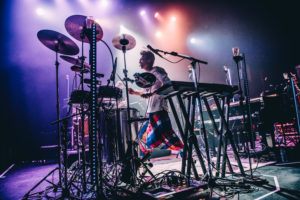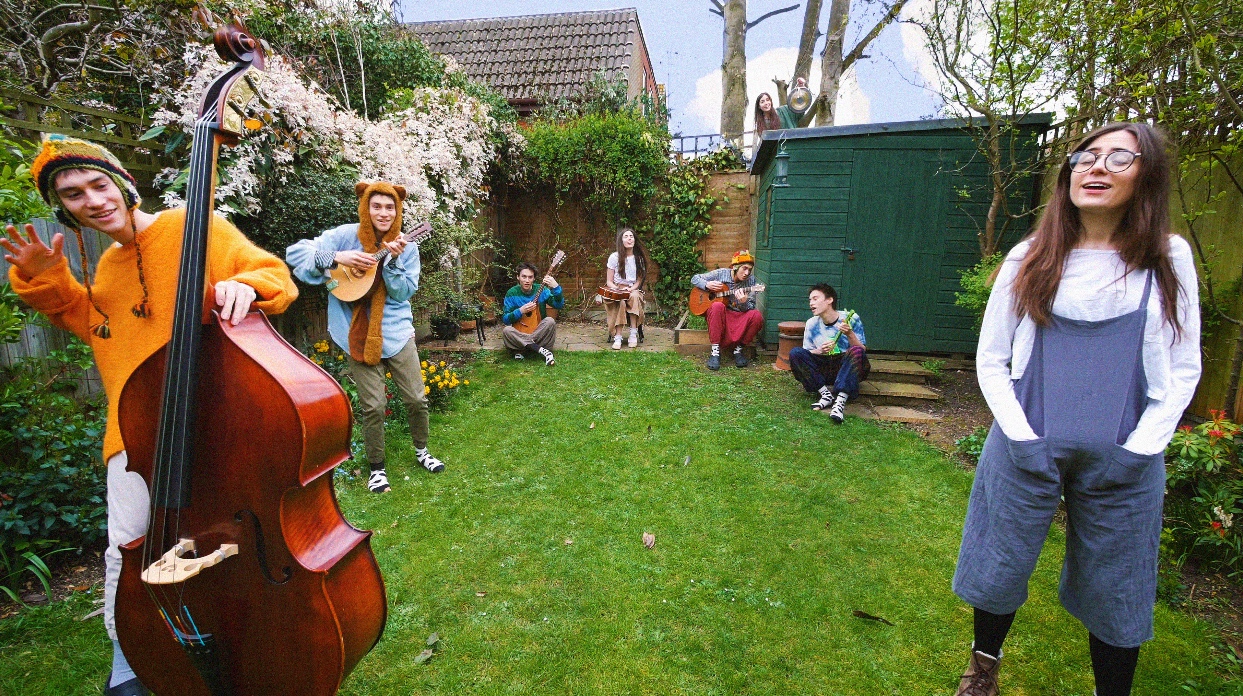Dodie Clark and Jacob Collier are both twenty-four-year-old Brits with self-started careers. dodie—who has a pearly voice, a bashful online persona, and a preferred lower-case “d”—has released three EPs and boasts a combined 2.7 million subscribers across her two YouTube channels, where she posts everything from music videos to folksy song collabs with buddies to intimate confessionals about her life and mental health, usually filmed in her bedroom illuminated by fairy lights. Collier was similarly discovered on YouTube, in his case by virtue of his complex musical arrangements and by Quincy Jones—legendary co-producer on Michael Jackson’s biggest-selling albums and somewhat of a character, in case you hadn’t heard. Jacob can sing in just about every vocal range there is, plays dozens of instruments, and won two Grammys for his 2016 debut In My Room.
The two first spoke on Twitter, and dodie got the ball rolling by contributing to an online project of Jacob’s. They seem like a natural fit to pair up—both enjoy harmonizing and duplicating their voices, something they do a lot in their first collaboration together, an odd and cheerful cover of The Beatles’ “Here Comes the Sun.” They filmed the accompanying music video in Jacob’s London backyard, using a technique called masking to double their bodies so there are multi-Jacobs and multi-dodies, alternatively playing bass, ukulele, xylophone, guitar, and singing or dancing outside on the grass.
Solo-wise, dodie just released a harrowing single called “Guiltless,” and soon she’ll be touring the U.S. and beginning work on her debut full-length. Jacob is releasing four albums within eighteen months, a project he’s calling Djesse (Volumes 1-4) that will feature all kinds of collaborators, from orchestras to choirs to drum troops. He’s world touring both this year and next, with the second Djesse installment out on July 19, featuring his Beatles tune with dodie.
We interviewed the pals and then they interviewed each other, covering everything from the benefits of starting out on YouTube, what their fans expect (or don’t) from them, and how they remain in creative control despite their increasing professional success.
How do you know each other?
Dodie Clark: We’re currently sitting in the café where we first met.
Jacob Collier: Yeah, we had our first date here. I had started this campaign called #IHarmU: it was essentially where people from all over the world could submit fifteen-second-long melodies and I would harmonize them and add additional voices with all these funny chords and grooves and rhythms. It was a campaign to earn a bit of money to put my first album together. I think I just asked dodie whether she’d be up to send me a melody, and she sent a really clever, cute one and I harmonized it, and we became firm friends from that point.
What has the process of transitioning from YouTube to the professional music industry been like?
DC: For me, they were always kind of interlinked. I couldn’t do it without the help of my team around me, because I had absolutely no damn idea. The only thing that’s changed, really, is bringing my own music into studios, working with other people, and being on tour with fans. That was difficult to navigate, honestly, because I was so used to working on my own and in my bedroom.
JC: The greatest challenge for me in scaling a bedroom aesthetic into something that had greater wings was the process of putting it on stage. I wanted to do a tour by basically touring the exact room I’d been creating music in my whole life, just me and all these instruments. So with some collaborators at MIT in Boston, these crazy maverick people, I put together this one-man show with six simultaneous looping machines and some interactive visuals and this custom-built instrument called a vocal harmonizer, which means I can sing the harmonies live.
I’d brought myself up as a sort of musical introvert and scientist, very interested in all of these little details. To take that on stage and share that process of creating and improvising with other people was huge for me. It’d been such an isolated process. I did a two-year world tour with my one-man show, which transformed my life.
I’m working on a quadruple album at the moment, Djesse, with about fifty songs total—it’s tons of music. dodie was kind enough to contribute to one of the songs, and I’ve been running around the whole world chasing my favorite musicians, from Africa to Portugal to Holland, and all over the States; there’s everything from orchestras to gospel choirs to folk singers to rock guitar legends to famous rappers and hip-hop stars. It’s a crazy array.
 And you improvise with the audience at the end of your shows, sort of conducting and playing them like a musical instrument.
And you improvise with the audience at the end of your shows, sort of conducting and playing them like a musical instrument.
JC: That’s something I’m so excited about! There are these Bobby McFerrin videos from an incredible concert he did entitled “Spontaneous Inventions” in the mid- to late-’80s. He’d walk on stage with one microphone and start improvising with the audience, call-and-response melodies. I was really inspired by that growing up, but I wanted to push it forward, do things with chords, with the audience singing in three- or four- or five-part harmonies. I guess by fluke of nature, I’ve accrued an extraordinarily musical fanbase, so if I play a show I can guarantee that 80 percent of them are musicians or love to listen to music actively. One thing I like to do is split the audience into kicks, snares, and hi-hats. They love the challenge. I’m such a believer in the human voice, and everyone needs just the tiniest excuse to get out of their shell.
Tell me about your collaboration on the cover of The Beatles’ “Here Comes the Sun.”
JC: One thing I’ve always loved about dodie is she sings so conversationally. It’s like she’s sitting right next to you, it’s so warm and heartfelt and unpretentious. And doing this song together, we came up with a way to navigate it in a brand new way: it changes key a bunch of times, goes into a sleepy samba groove in the middle, we play some percussion. We essentially got in a room and goofed around for a couple of days. dodie has done this a ton of times, planning a video and seeing it come to life.
“One thing I’ve always loved about dodie is she sings so conversationally. It’s like she’s sitting right next to you, it’s so warm and heartfelt and unpretentious.” — Jacob Collier
DC: We didn’t really have any plans for a while, but Jacob and I have both done split-screen type things, so we thought it’d be quite cool to do that again together. I’d never done a split-screen outdoors because the lighting changes…
JC: What you’re doing is visualizing about six or seven Jacobs and dodies on screen at once, and then we do this process called masking, where you take a video and superimpose another video on top, and cut out the bit you want to keep. dodie became a master of masking. But if the sun comes out in one take, you have to start again. We wanted to visually explain the idea in a way that was simple, but had this childish depth to it. It’s nice to portray things almost the way a child would see them, with all these different colors and sounds.
Dodie, you have a new single out called “Guiltless”—what does that song mean to you?
DC: That was a way of writing about something I couldn’t really talk about comfortably and openly, as I sometimes will. I started with the line, “No use getting angry at the way that you’re wired,” because I had a therapy session [laughs] that explored forgiving people because of how they were raised, and the reasons they are the way they are.
You’ve spoken a lot about your personal mental health on YT. What’s been hard or beneficial about going public with those struggles?
DC: A challenge is being so vulnerable, especially with something that you might not have processed yet. Particularly with “Guiltless,” it’s such a personal topic, and there was one night on tour where I wasn’t feeling very well about it, and then someone was whistling it walking down the corridor. And I thought “Crap, what have I done? Why have I written a song about something so painful? And someone’s just whistling it!” I regretted it, then.
But in playing it every single night, you’re forcing yourself to process those feelings, and sharing it with a room of other people who are crying with you, so it does make you feel less alone. With the mental health stuff, a symptom is feeling like you’re the only one who feels that way. So there’s a gift in sharing it—and writing or making something about it gives you the sensation of wrapping it with a bow and putting it to the side, almost as if you’ve taken something that’s so painful and made something beautiful out of it.
Jacob, how did you connect with Quincy Jones and end up signing to his management company?
JC: I spent my teenage years making these wacko YouTube videos with all these different layers, harmonies, and grooves, and one of those videos found its way to Quincy. It was an arrangement of Stevie Wonder’s “Don’t You Worry ’Bout a Thing,” one of my all-time favorites. I totally reimagined it, played all the instruments myself, and Quincy said, “This is fresh, I want to be involved in some way.” It absolutely destroyed my mind. He said, “What would you like to do?” He’s opened doors without pushing me through them. He’s enabled me to be who I want to be, and at this point he’s more like a godfather figure than a manager. Any time I spend with him is such a ridiculous privilege—you can ask him about any of your heroes or any events basically within the last eighty years, and he somehow would’ve been there in the room and has an incredible anecdote, whether it’s Picasso or Miles Davis or Stravinsky or Ella Fitzgerald. For me, I’ve recognized it’s possible to be as extravagantly successful as a man like that, but with so much humility and humanity. He’s music’s greatest living pioneer, I suppose, and yet he’s so down-to-earth and passionate.
Any questions for each other? Something you’ve always wondered?
DC: Jacob, would you talk about the limitations and variations of your vast musical knowledge?
JC: Jeez Louise! Well, as we grow older, we learn more and more about the world, and one thing I’ve always believed is that when you’re young, you’re the most infinite, because you don’t know enough to close down your brain. So as I’ve grown older, I’ve learned more about music, but now when I sit down to write songs, my color palette is so big that it’s sometimes hard to focus.
When you take this great big language, how do you say something meaningful with it? There’s a period of time when everyone is learning as they’re young, and there’s a period of time when you’re thinking, “Surely the thing that’s most powerful has the most craziness in it!” I had a lovely phase in my life when I had a lot of fun just exploding my imagination and creating with no boundaries whatsoever, everything on the page at once.
Most people say “less is more” when they’re teaching you how to be creative—but for me, I found something like school quite difficult for that reason. People would be closing me down a lot, saying, “That’s too crazy.” But I loved pushing things as far as they could possibly go. That’s what my four-album epic is all about: trying to elevate my own knowledge, but also distill it into something that I can look back on and be proud of. A journey of things that are possible in the music world—every genre under the sun is covered.
“I’ve had studio producers say, ‘It’s interesting that you’re not just on your phone at the back, that you have your headphones on and are listening.’ And I’m like—obviously I am! I care so much!” — dodie clark
dodie, how important do you think it is for people to hear your voice, both literally your human voice, and also your aesthetic voice, having your own hand in the things you make, taking ownership? Where do you draw the line between doing things on your own and letting a team shape your ideas into something that can be consumed on a mass scale?
DC: It’s been really interesting to figure out what my voice is. In first bringing my music to producers, I realized that everyone expected me not to get as involved. I’ve had studio producers say, “It’s interesting that you’re not just on your phone at the back, that you have your headphones on and are listening.” And I’m like—obviously I am! I care so much! I think I need more of a sound engineer/co-producer to sprinkle in ideas I’d never think of, but also I almost produce my songs myself, and then bring them to someone else to make them sound and feel how I want them to.
JC: Yeah, we’re both artists who care a lot about how our music feels to people. When dodie and I listen to music that’s not our own, we’ll point out, “Oh, don’t you love how that feels so deep? Or like everything’s opening up? Or really hushed? Or like you’re really far away?” These kinds of terms are important for artists to think in. I also think it’s of paramount importance that artists who are starting to create things maintain their own tastes and have the courage to bring those to the forefront. There are always people who’ll tell you, “I wouldn’t put that song on the record.”

Jacob Collier / photo by Mathew Tucciarone
DC: I recently tried writing a song completely not for myself, a pop song, to prove that I could. I was getting very frustrated with the radio and I was telling my publisher that I could write any of the songs on there, which sounds incredibly arrogant. And he was like, “Why don’t you?” and I was like, “Fine, I will!” So I did. I went into the studio and honestly, it was freeing to give someone a song I’d written and say, “Do whatever the heck you want, I don’t care.” This is not like me normally—I’m so picky about every single sound.
JC: This is a slightly different thing, but for me, when it comes to collaborating with all these different musicians around the world, it’s very interesting to have an idea, and think, “This is definitely the idea I want to use, and I feel strongly about it, I made it myself,” but then to walk out of a session at the end and realize how much it’s completely changed…and that’s fine! There’s a lesson to be learned for both of us bedroom introvert musicians, about having ideas that can change and having that be a positive thing—it’s a lovely way of growing, while at the same time, realizing how important it is to have your own voice at the center of what you do.
“There’s a lesson to be learned for both of us bedroom introvert musicians, about having ideas that can change and having that be a positive thing—it’s a lovely way of growing.” — Jacob Collier
I’d say my fanbase right now values the honesty of things I create, and they know those things have come from me and are an amalgamation of my tastes, rather than anybody else’s. They don’t expect that I’m going to make jazzy songs or rocky songs or a capella songs, they just expect that I’ll be myself. That’s an amazing thing to aim to accomplish: a fanbase who trusts that I’ll always speak with my own voice. It’s a person they’re connecting with.

dodie clark / photo by Kyle Jones
You both started out on YouTube, so fans probably feel like they know you already. It’s intimate to see inside your bedrooms and spend all this time with you there, so you’re not some distant pop stars being controlled by your label or management company.
JC: It’s nice to start there, though it can be hard to maintain it. As you get more successful, people do expect things of you. It’s tough being vulnerable creatively, on any level. To say, “This is what I believe, this is what I create, this is who I am. And I’m sharing this with you.”
DC: Yeah, it’s a difficult thing to balance. Obviously there’s something wonderful about being so involved with your own community, but then people will meet you and have this kind of entitlement—that sounds mean—but it’s like an expectation that you know each other, when you don’t. So it’s important to recognize that, and that the boundaries are still there.
Any more near-future plans to team up?
JC: Definitely not. I think we’re done now. [Laughs]. We’re both on these separate roads at the moment, but I’d be highly surprised if we don’t end up collaborating at some point in our lives again. FL







